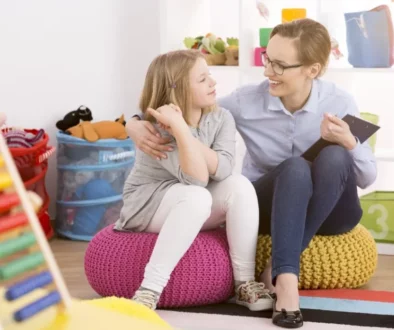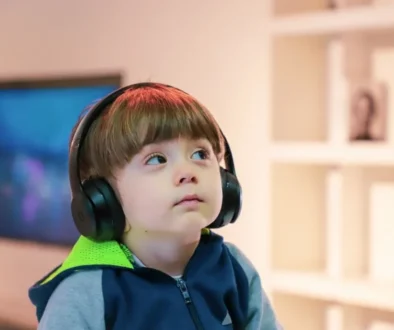A Guide to the Signs of Autism in Infants and Babies
Contents
- Understanding Autism Spectrum Disorder
- The Importance of Early Detection
- Early Signs of Autism in Infants
- When to Reach Out to a Pediatrician
- Next Steps After a Screening
- Early Intervention: Making a Difference
- Supporting Your Child and Yourself
- Common Questions About Identifying Autism in Babies or Infants.
- Moving Forward with Confidence
Start Your Child’s Autism Journey With Confidence
As a parent, there’s nothing more important than the health and happiness of your child. When it comes to understanding autism, early awareness can help you take meaningful steps to support your child’s development. Spotting the early signs of autism in infants can feel overwhelming, but with knowledge and the right support, you can feel more prepared to navigate this journey.
Through this guide, we’ll explore the early signs of autism in infants, providing you with the information you need to recognize potential developmental differences. But remember—this isn’t just about spotting signs. It’s about helping you feel confident in how to support your child, every step of the way.
Understanding Autism Spectrum Disorder
Autism Spectrum Disorder (ASD) is a neurological condition that affects how individuals interact with others, communicate, and process information. Because autism exists on a spectrum, no two children with autism will have the exact same experiences or challenges. This spectrum can make autism hard to spot in very young children, especially infants.
But recognizing early signs allows for earlier intervention, which can make all the difference. Early support has been shown to boost communication and social skills, paving the way for a better quality of life. As you watch your infant develop, knowing what to look for can give you the confidence to ask the right questions if needed.
The Importance of Early Detection
One of the key insights I’ve gained from working with families raising children with autism is that helping parents feel prepared is essential. The more equipped you are to understand your child’s needs, the better you can support their unique journey. Early detection of autism gives parents time to connect with resources, specialists, and intervention programs. With the right tools, the entire family can adapt and thrive, making life smoother for everyone involved.
Early Signs of Autism in Infants
Autism can sometimes present in subtle ways during the first year of life. While every baby grows at their own pace, certain signs may suggest developmental differences. The following behaviors might indicate early signs of autism in infants. However, it’s essential to remember that these are potential markers, not definitive diagnoses.
1. Lack of Eye Contact
By the time babies reach about 2 to 3 months, they typically start making eye contact with caregivers. If your baby avoids eye contact or seems uninterested in faces, it could be worth observing this behavior more closely. Many infants with autism struggle with maintaining eye contact, which is one of the earliest social interaction milestones.
2. Delayed or Absence of Social Smiling
Babies generally begin smiling in response to interaction around 6-8 weeks of age. If your infant isn’t smiling by 3 months, or if their smiles feel more reflexive than social, this could be an indicator of social communication challenges. This delay in showing joy during interactions is one sign that may warrant further attention.
3. Limited Babbling or Vocalization
Babies typically begin babbling between 6-9 months, experimenting with different sounds as they learn to communicate. If your baby isn’t babbling or their vocalizations seem minimal compared to other infants, it might be worth discussing this with your pediatrician. Children with autism often show delays in verbal communication, so this is a crucial behavior to watch for.
4. Repetitive Movements
Many babies go through phases of repetitive movements, like flapping hands or stiffening limbs. However, when these movements persist or occur frequently, it could signal early signs of autism. The key here is whether these behaviors feel constant and don’t seem connected to any particular activity, excitement, or upset.
5. Unusual Sensory Reactions
Babies are constantly exploring their world through their senses. Some infants with autism might have heightened sensitivity to sensory stimuli like bright lights, loud sounds, or specific textures. Alternatively, some may not seem to react to these stimuli at all. If your baby is overly sensitive or unresponsive to sensory experiences, it may indicate a sensory processing issue related to autism.
6. Limited Use of Gestures
Babies typically use gestures such as pointing or waving by around 9-12 months to communicate their needs or draw attention. A lack of gestures or a reliance on crying or other indirect means of communication can signal a developmental delay.
7. Not Responding to Their Name
By their first birthday, most babies respond to their name when called. If your baby doesn’t seem to recognize their own name or respond consistently, it could be a red flag. Ignoring their name, despite consistent use, may be an early indicator of autism-related social communication challenges.
If you’re concerned about your child’s development you can get expert testing, early intervention guidance, and support tailored to your family’s needs now.
When to Reach Out to a Pediatrician
If the behaviors mentioned above seem persistent or concerning, it’s important to discuss them with your pediatrician. Early intervention plays a key role in supporting a child’s development. During regular checkups, your doctor can help monitor developmental milestones. If you notice any delays, be sure to bring them up.If the behaviors mentioned above seem persistent or concerning, it’s important to discuss them with your pediatrician. Early intervention plays a key role in supporting a child’s development. During regular checkups, your doctor can help monitor developmental milestones. If you notice any delays, be sure to bring them up.
You can also reach out to Developmental Pediatrics for additional support. We collaborate with many doctors and provide testing, guidance, and specialized care to help families navigate the early stages of autism diagnosis and treatment.
Consider keeping a journal of your child’s behaviors to share with your pediatrician. This can help in assessing your child’s development and tracking progress over time.
Next Steps After a Screening
At Developmental Pediatrics, you can access evaluations tailored to your child’s needs, along with guidance on early intervention programs like speech and behavioral therapy. Early intervention is key to providing your child with the tools they need for development, and seeking professional help can make a big difference.
Getting involved with local resources like support groups can also be helpful. These communities offer emotional support and practical advice to help you navigate the journey more confidently.
Remember, early intervention empowers not only your child but also you as a parent, providing the tools and resources needed to create a nurturing environment for your child to thrive.
Early Intervention: Making a Difference
As someone with years of experience working with families navigating an autism diagnosis, I’ve seen firsthand how early intervention can transform outcomes. Starting intervention services early—such as speech therapy, occupational therapy, or behavioral therapy—can help children with autism develop critical skills. And perhaps more importantly, it can empower parents with the tools they need to create a supportive environment for their child.
Early intervention is about more than just addressing symptoms. It’s about building a system of care around your child that helps them succeed, both at home and in the wider world. It’s about recognizing that every child, regardless of the challenges they may face, has the potential for a fulfilling and joyful life.
Supporting Your Child and Yourself
Caring for a child with autism, especially when you’re still learning what that means, can feel overwhelming at times. But you are not alone. The path may be filled with questions, but there are answers out there—and plenty of people and resources ready to support you. Joining parent support groups, seeking counseling, or even reaching out to online communities can offer valuable insight and reassurance.
The truth is, autism doesn’t just shape your child’s experience; it shapes the family dynamic as a whole. Finding ways to understand and accommodate your child’s needs will not only help them but will make your journey as a parent more rewarding. As you learn to meet your child where they are, you’ll discover new ways to celebrate their progress and victories.
Common Questions About Identifying Autism in Babies or Infants.
What noises do autistic babies make?
Autistic babies may produce fewer vocal sounds, such as babbling or cooing, compared to neurotypical infants. Some may make repetitive or unusual noises, such as grunting, humming, or high-pitched sounds. Their vocalizations may also lack the usual social cues or engagement associated with early speech development.
At what age can autism be detected in babies?
Signs of autism can often be detected as early as 6 months, with more pronounced behaviors emerging between 12 and 24 months.
Autistic infants may show limited interest in social interactions. They might avoid eye contact, not smile responsively, or fail to react to familiar voices.
What are early physical signs of autism in babies?
Early physical signs can include a lack of gesturing, limited facial expressions, and repetitive hand movements like flapping or stiff postures. Some may also exhibit delays in reaching motor milestones.
Moving Forward with Confidence
Spotting the signs of autism in infants may feel like the first step in a long journey, but it’s also the beginning of empowerment. Understanding the signs, seeking expert guidance, and accessing early intervention can make a world of difference. Remember, no two children are alike, and that’s true in autism as well. What’s most important is that you, as a parent, feel prepared to support your child in the best way possible.
Helping your child grow into their potential, while providing them the support they need, is the greatest gift you can offer. And with the right resources, you’ll find yourself feeling more confident and ready for the journey ahead.
Links and Resources for More Information about Autism in Babies & Infants.
- Why Early Detection of Autism Is Crucial
https://successonthespectrum.com/early-detection-of-autism-is-crucial-2/ - Understanding the Early Signs & Symptoms of Autism
https://www.capitalareapediatrics.com/blog/understanding-the-early-signs-symptoms-of-autism - Early Detection of Autism in Infants, Toddlers, and Preschoolers
https://insightplus.mja.com.au/2022/15/early-detection-of-autism-in-infants-toddlers-and-preschoolers/ - The Importance of Early Autism Testing in Children
https://upsidetherapy.com/the-importance-of-early-autism-testing-in-children/ - Signs of Autism in Babies: What to Look For
https://www.medicalnewstoday.com/articles/autism-in-babies - Early Autism Detection and Intervention
https://www.ncbi.nlm.nih.gov/pmc/articles/PMC5232420/ - Identifying Early Autism Symptoms in Infants
https://www.sciencedirect.com/science/article/abs/pii/S1750946719301849



